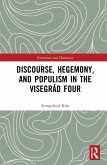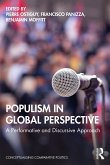Populism is on the rise in Europe and the Americas. Scholars increasingly understand populist forces in terms of their ideas or discourse, one that envisions a cosmic struggle between the will of the common people and a conspiring elite. In this volume, we advance populism scholarship by proposing a causal theory and methodological guidelines - a research program - based on this ideational approach. This program argues that populism exists as a set of widespread attitudes among ordinary citizens, and that these attitudes lie dormant until activated by weak democratic governance and policy failure. It offers methodological guidelines for scholars seeking to measure populist ideas and test their effects. And, to ground the program empirically, it tests this theory at multiple levels of analysis using original data on populist discourse across European and US party systems; case studies of populist forces in Europe, Latin America, and the US; survey data from Europe and Latin America; and experiments in Chile, the US, and the UK. The result is a truly systematic, comparative approach that helps answer questions about the causes and effects of populism.
"This pioneering volume is the first collection of empirical, mostly comparative, studies of populism at the elite and mass level, which is truly grounded in the increasingly dominant ideational approach. It should be required reading for both the few old and the many new scholars of populism." Cas Mudde, Stanley Wade Shelton UGAF Professor, University of Georgia, USA
"This volume is sure to be a landmark in the comparative study of populism. It brings together a team of scholars who share an ideational approach to the study of populism, and it demonstrates how this approach lends itself to a wide range of methodological tools - both quantitative and qualitative - to empirically analyze populist ideas in elite political discourse and mass beliefs. In so doing, it brings much-needed analytical coherence to a field of study where scholars too often disagree on fundamental concepts and speak past one another." Kenneth M. Roberts, Richard J. Schwartz Professor, Cornell University, USA
"The Ideational Approach to Populism is a timely and compelling book that takes seriously the ideology and appeals of populist movements. Its rigorous and compelling analyses of populism range from Latin American party manifestoes, to episodes of historical populist mobilization in Europe, to experimental evidence regarding the role of corruption as a catalyst for populist support. The result is a rich and multi-faceted volume that is a must-read for scholars of populism - and for others intrigued by the phenomenon." Anna Grzymala-Busse, Michelle and Kevin Douglass Professor, Political Science, Stanford, USA
"This volume is sure to be a landmark in the comparative study of populism. It brings together a team of scholars who share an ideational approach to the study of populism, and it demonstrates how this approach lends itself to a wide range of methodological tools - both quantitative and qualitative - to empirically analyze populist ideas in elite political discourse and mass beliefs. In so doing, it brings much-needed analytical coherence to a field of study where scholars too often disagree on fundamental concepts and speak past one another." Kenneth M. Roberts, Richard J. Schwartz Professor, Cornell University, USA
"The Ideational Approach to Populism is a timely and compelling book that takes seriously the ideology and appeals of populist movements. Its rigorous and compelling analyses of populism range from Latin American party manifestoes, to episodes of historical populist mobilization in Europe, to experimental evidence regarding the role of corruption as a catalyst for populist support. The result is a rich and multi-faceted volume that is a must-read for scholars of populism - and for others intrigued by the phenomenon." Anna Grzymala-Busse, Michelle and Kevin Douglass Professor, Political Science, Stanford, USA









